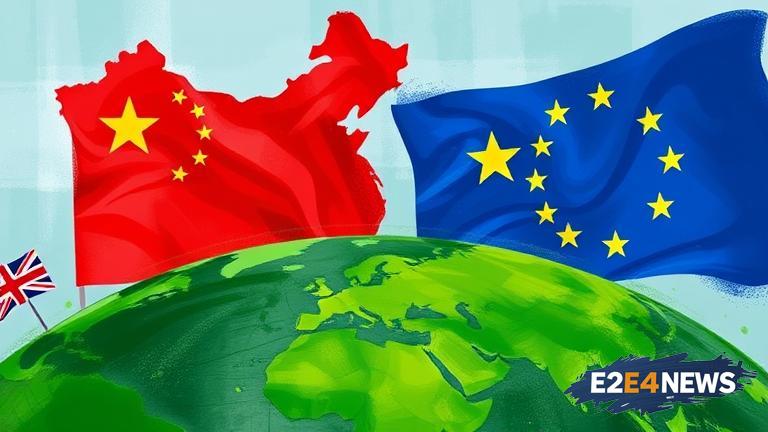The European Union and China are engaged in an increasingly heated dispute over green technology, with significant implications for the global sustainability landscape. The EU has imposed tariffs on Chinese solar panels and other renewable energy equipment, citing unfair trade practices and subsidies. China has responded by launching its own investigations into EU trade practices and imposing duties on European wine and other products. The dispute has escalated in recent months, with both sides investing heavily in renewable energy and seeking to dominate the global market. The EU has set ambitious targets for reducing greenhouse gas emissions and increasing the use of renewable energy, and is seeking to promote the development of green technologies such as solar and wind power. China, meanwhile, has become a major player in the global renewable energy market, with companies such as Trina Solar and Yingli Green Energy leading the way. The Chinese government has also invested heavily in renewable energy, with a focus on solar and wind power. The dispute between the EU and China has significant implications for the global sustainability landscape, with both sides seeking to promote their own green technologies and trade practices. The EU has accused China of unfairly subsidizing its renewable energy industry, and of dumping cheap solar panels and other equipment on the European market. China, meanwhile, has accused the EU of imposing unfair trade restrictions and of seeking to protect its own industries at the expense of Chinese companies. The dispute has also drawn in other countries, with the United States and Japan among those seeking to promote their own green technologies and trade practices. The global renewable energy market is expected to continue growing rapidly in the coming years, driven by increasing demand for sustainable energy sources and government policies to promote the use of renewable energy. The EU and China are likely to remain major players in this market, with both sides seeking to promote their own green technologies and trade practices. The dispute between the EU and China has significant implications for the global economy, with trade restrictions and tariffs likely to increase costs and reduce demand for renewable energy equipment. The dispute also has significant implications for the environment, with the promotion of green technologies and sustainable energy sources critical to reducing greenhouse gas emissions and mitigating the impacts of climate change. The EU and China must work together to resolve the dispute and promote the development of green technologies, rather than seeking to protect their own industries and trade practices. This will require a commitment to fair trade practices, the removal of trade restrictions and tariffs, and a focus on promoting sustainable energy sources and reducing greenhouse gas emissions. The global community must also work together to address the challenges posed by climate change, and to promote the development of green technologies and sustainable energy sources. This will require a coordinated approach, with governments, companies, and civil society organizations working together to promote sustainable development and reduce greenhouse gas emissions. The EU and China have a critical role to play in this effort, and must work together to promote the development of green technologies and sustainable energy sources. The dispute between the EU and China is a significant challenge to the global sustainability landscape, but it also presents an opportunity for both sides to work together and promote the development of green technologies. By resolving the dispute and promoting fair trade practices, the EU and China can help to drive the growth of the global renewable energy market, and promote the use of sustainable energy sources. This will require a commitment to cooperation and a focus on promoting sustainable development, rather than seeking to protect individual industries and trade practices. The EU and China must also work together to address the challenges posed by climate change, and to promote the development of green technologies and sustainable energy sources. This will require a coordinated approach, with governments, companies, and civil society organizations working together to promote sustainable development and reduce greenhouse gas emissions. The global community must also work together to promote the development of green technologies and sustainable energy sources, and to address the challenges posed by climate change. This will require a commitment to cooperation and a focus on promoting sustainable development, rather than seeking to protect individual industries and trade practices.





